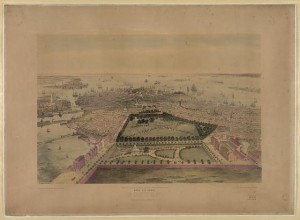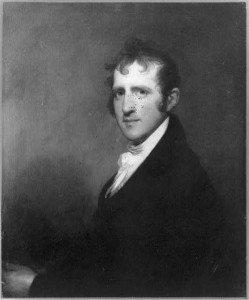It seems that this civilian correspondent could relate just about all his topics to the war.
From a Seneca County, New York newspaper in 1864:
LETTER FROM BOSTON.
BOSTON, MASS., July 11, 1864.
FRIEND STOWELL: – Now that our “Russian visitors,” have departed, the “glorious Fourth” been duly celebrated, and the public elation over the capture of the Alabama somewhat subsided, the “hub” has once more settled down to the contemplation of war matters and the various aspects pertaining to the rise and fall in the gold market.
As I have alluded to the Russians, I must here state, for the benefit of your readers who have not already been informed of the fact, that our city government “put them through in big shape.” Rear Admiral Lezsoffski [S.S. Lesovskii] and all of the minor “swabs,” as Jack would call them, of the imperial squadron, expressed themselves intensely satisfied with the way things were done up. As well they might have been; for they were shown around through all our city institutions, including the public schools, the children of which gave a grand entertainment for their benefit. A steamer was chartered, and the city government, the officers of the fleet, and a number of invited guests went down the harbor on a fishing excursion, having a “high old time,” of course. Four or five hundred of the sailors of the fleet, with officers, paraded thro [?] our principal streets one day, agreeable to an invitation of the City fathers, dressed in their nicest clothes. After the parade, a photograph was taken on the Common where they were treated to a substantial dinner. These sailors were really a fine, hardy-looking set of men, whom it was pleasing to look upon in these awful days of conscription, which has developed so much physical disability among the male population of Massachusetts!
But the most noteworthy event attending the visit of the distinguished foreigners was the entertainment given in their honor by the city government, at the Revere House, which was a truly brilliant affair. – Most of our great literary political guns were present, and some very able speeches delivered, while[,] of course, there was considerable other talk got off which didn’t amount to much.
It is hoped that these representatives of the Russian government were really as favorably impressed with our country and our manners, and especially our treatment of themselves, as they pretended to be, and that this visit will have the effect to draw still closer the bonds of friendship which exist between the United States and Russia. For the homage and respect paid to her Royal representative, a few years since, by our people, England has placed on the ocean armed cruisers to destroy our commerce, and is otherwise doing all in her power to assist our enemies to injure and embarass [sic] us. But we have reason to expect far different results from this visit of the Russian officials to our shores.
The fourth was celebrated in this city in the usual spirited manner. There appeared to be more stragglers in town than on former anniversaries, probably owing to the fact that there were no public celebrations in the surrounding towns and cities.
Another of the distinguished historic men of Massachusetts has departed from the scenes of earth. Hon. Josiah Quincy, Sr., died in his residence in Braintree, on the 1st inst., aged ninety-two years and six months – having been born in the midst of the turmoil and strife which resulted in the separation of the Colonies from the Mother Country, and, after witnessing our country’s growth and prosperity, his last gaze beholds it in the throes of dismemberment and ruin. Mr. QUINCY was a graduate of Harvard College, and studied law under WM. TAILOR of this city. He was first elected to Congress in 1805, and was subsequently re-elected three terms. He served several terms afterwards in the Massachusetts Senate, and two in the House – once as speaker. He was a member of the State Convention in 1820 which revised the Constitution. – In 1822 he became Judge of the Municipal Court of Boston. He was elected Mayor of the city in the following year, which position he held until 1829, when he was chosen President of Harvard College, where he remained till 1845, when he retired from this post, and subsequently principally devoted his time to literary and scientific pursuits.
Several Massachusetts three years’ regiments have already come home, but skeletons of the noble organizations which marched away three years ago one thousand strong. The reception of these veterans in some cases, has been generous and such as their heroic deeds merited; but in others, they have arrived in our city and departed hungry and weary, with no one to say even “Thank you” to them for their services, and only a brief paragraph, penned by some watchful reporter informed the public of their arrival. This neglect is outrageous, and goes to show the narrow-contractedness of human nature – particularly in this “one idea” region! But these heroic remnants will have justice done to their merits yet; for their [sic] is a day of reckoning yet to come!
Matters are at a stand still here in political circles. Everyone is too busily engaged in procuring a living, at the starvation prices which are now ruling the markets, to give much attention to politics. While all articles of food and wearing apparel have doubled from what they were formerly, the wages of mechanics and laborers have increased but a few per cent. over what they were in good times. This is a wrong state of things, and must sooner or later, if the present war continues, culminate in difficulty between employers and employees. – Where a man formerly received $12 per week, he should now obtain $24, which would be really hardly as much as $12 under the old state of things. But instead of that, where a mechanic once got $12, he now gets $15, with a fair prospect of being obliged to let his family freeze or starve to death next winter, unless an over-ruling Providence takes the matter in hand and gives relief.
The late call of the President for one hundred days men, is not meeting with quite as ready response in this neighborhood as the call for three months’ men in ’61 did. Somehow or other those very good men who are so fierce about “sustaining the Administration” don’t seem to consider it their duty to take a musket in hand, even to guard Washington – although some of them express a willingness to go if they “can have a commission!” “Bully boys,” ain’t they though? The “vets” who have just got home, after a three years’ rough-and-tumble “can’t see it;” consequently recruits are coming in slowly. But as Uncle Abe threatens the country with another five hundred thousand soon, for only two or three years, as the case may be, it is quite likely that somebody will have to go whether he wants to or not.
There has been no rain to speak of thro’-out this section of country for some weeks, consequently the crops and vegetation are in a very dry condition. The roads are horribly dusty, and even the streets of our city need a good washing down. More anon.
Fraternally Yours,
OLIVER.


